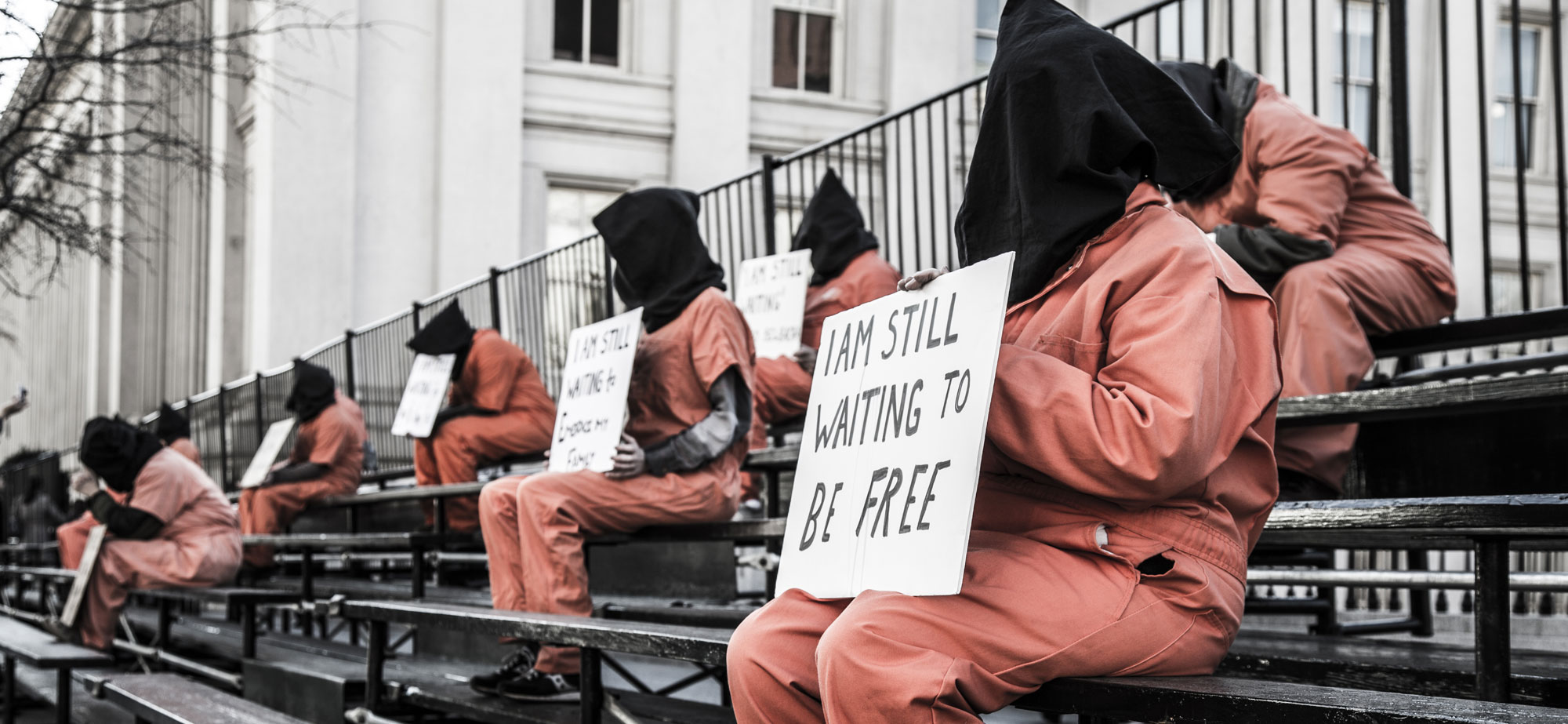From the Archive
Jeremy Varon’s remarks at NYC protest
Remarks on Guantanamo and Empire – Jeremy Varon
Delivered at a protest in New York City on January 11, 2023
***
We gather today to call for the closure of the U.S. prison at Guantanamo, stupefied and infuriated that we are still gathering to demand that it at last close. The story of our protest today is the persistence of our protest, now for decades.
Our presence is grounded in the enduring shame of Guantanamo itself, and our stubborn insistence on hope against hope, for the sake, above all, of the men still held there. We will not abandon them.
On this grim anniversary let me reflect on what Guantanamo has been, what it came to represent, and what I think it now is.
From its first day of operation, Guantanamo was a place of the savage abuse of human beings, demonized by means of false accusation and religious and racial bigotry. Just this morning in The Guardian newspaper, Mansoor Adayfi recounted that torment:
I was 19 when I was sent to Guantánamo. I arrived in February 2002, blindfolded, hooded, shackled, beaten. When soldiers removed my hood, all I saw were cages filled with orange figures. I had been tortured. I was lost and afraid and confused. I didn’t know where I was or why I had been taken there. I didn’t know how long I would be imprisoned or what would happen to me. No one knew where I was. I was given a number and became suspended between life and death.
With modest variation, his experience is the experience of all the men who have passed through, or remain, in the camp.
Fortunately, people in this country and all over the world were horrified by what they learned of Guantanamo in the early 2000s. In courtrooms and in the streets they called out U.S. torture and called for Guantanamo to close.
Witness Against Torture formed in 2005, at the height of the War on Terror, when 25 Americans went on a pilgrimage to Cuba to fast, pray, and protest outside the US naval base in solidarity with the detained men. Their conscience was called by the extreme threats to life and dignity at the prison.
But their action was based also on a strategic assumption: that closing Guantanamo was a winnable issue — indeed the low-hanging fruit among the demands of a mass antiwar movement, arrayed against a war-mongering, but faltering, American president. The lawlessness and immorality were so egregious, the condemnation all over the world was so severe. Surely the combined force of the courts, public opinion, geopolitical pressure, and the defiance of the detained men themselves would reel America back from this darkest pocket of the dark side. Thereafter, much of the work was to make the detained men subjects before the law, entitled to due process, and able to win their release by challenging their detention.
Guantanamo, in short, was assailed as a terrible, but reversible, extreme of the already awful War on Terror.
That era of campaigning achieved apparent victory with Obama’s day one promise to close the prison. But Obama abandoned his own pledge. Courts clawed back hard-won rights, while some in congress demagogued the issue, appealing to the same fear-mongering and Islamophobia that drove the Bush era War on Terror. “Broken Laws, Broken Lives, Broken Promise” was Witness Against Torture’s signature slogan for the Obama era.
Only by the tenacious resistance of the detained men, their attorneys, and global advocates was the population of the prison brought down. Surviving Obama’s tenure, Guantanamo was now a symbol of feckless capitulation, shameful liberal tolerance of the intolerable, and the enduring power of the national security state to defy or gerrymander the law.
Guantanamo, thank heavens, never quite captured Trump’s dark imagination, and his threats to fill the prison anew never materialized. Largely forgotten, Guantanamo was nonetheless during his regime a shadowy echo of all things Trump: the demonization of the foreign, dark skinned other; wanton lawlessness and deliberate cruelty; lies, big and small; and the deep assault on purported, American democratic values. During Trump’s reign, people of good conscience worked mostly to defend U.S. society and its institutions from the assault, now internal, often visited by the United States on foreign peoples.
So what is Guantanamo now, two years into another liberal presidency, whose official policy is again to close the prison. As we have heard today, a pitiful five men have been released under Biden, while those remaining continue to endure petty cruelties. We know all the alleged reasons why the prison remains open: that it’s hard to find countries that will take released Guantanamo prisoners; that congress still stands in the way; and that the politics remain fraught, with small electoral margins on the line. We reject these reasons as craven excuses.
We can imagine other explanations. Among them, that institutional inertia has set in, giving Guantanamo an inextinguishable life of its own. Budgets, careers, protocols, deployments, rules, routines, and endless legal processes are are all tied to the prison.
But this explains only so much.
Guantanamo ultimately endures, I think, as the chronic, festering immorality of the American empire, reliant on double standards and incapable of reckoning with its cruelties and hypocrisies.
Representatives Adam Schiff, Jaimie Raskin and even Liz Cheney speak so eloquently about accountability, the sanctity of the rule of law, and the need for equal treatment of the most and least of us. Their sincere aim is to save America’s frail democracy and tattered soul.
But such noble sentiments drown somewhere off the Florida coast, far from Guantanamo’s shores. The demand for democracy, dignity, and rights for a mythical conception of “us” somehow accepts the continued misery and disenfranchisement of “them” — the alleged monsters of a bygone era whose fate is easiest to ignore.
The United States has not closed Guantanamo — perhaps it cannot close Guantanamo — because it cannot, as it currently exists, reckon with the violence, racism, and abuse that has always been part of the American project.
Closing Guantanamo, we have painfully learned, is about so much more than closing Guantanamo. It has meant confronting, against the tides of denial, the deep structures of American empire — its past and future, and the lies it tells itself.
Which means that our work is so big and so important, and that the reward even of small victories — like the next release of a man from the island prison — is so profound.



Join us on social media